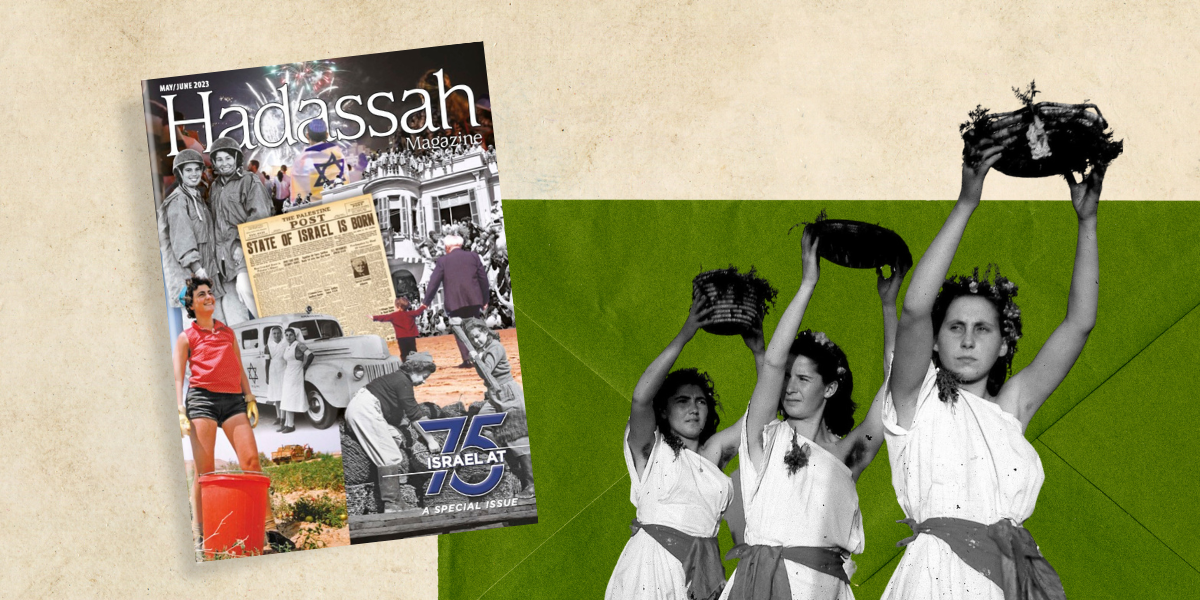Hadassah
Letters to the Editor
Letters to the Editor: May/June 2023

We want to hear from you! We value your interest in Hadassah Magazine and welcome hearing from you. Please email letters to the editor to letters@hadassah.org.
Veganism and Halacha
As Jews, we are commanded to avoid causing unnecessary suffering to animals (tzaar ba’alei chayim). Paradoxically, most of our holiday meals include animal flesh or animal milk or eggs, all of which result from cruel animal husbandry and none of which can be said to be the result of “necessary” suffering.
It is easy to feel isolated as a Jewish vegan who seeks to avoid the consumption of animal products. You can imagine, then, how joyful I felt to see that the May/June 2023 issue included “Shavuot’s Origins as a Wheat Harvest Festival,” which highlights the laudable campaigns of vegan activists in Israel. I urge fellow readers to research breeding, farming and slaughter practices and then reconsider whether such consumption in today’s day and age is in keeping with our mitzvot.
Dara Lovitz
Bala Cynwyd, Pa.
Veganism is acceptable under Jewish law, for the most part, as is meat consumption and animal milk. But the claims made by Rabbi Asa Keisar in this article are the opinion of his advocacy group—not one shared by the
vast bulk of Orthodox rabbis today.
Keisar’s group hardly acts as a deciding rabbinical body. People can follow his opinion for their personal (not communal) practice, just as people are free to follow the rabbinical majority on this issue. Until Keisar’s views become the majority opinion, based on the halachic approach and method, we should keep in mind that veganism is an extra-Torah ideology that may have its own ideological agenda.
Alan Hoffman
East Windsor, N.J.
In the Torah, Shavuot is about the giving and receiving of the Torah, not about the wheat harvest. As for the tradition of eating dairy for the holiday, there are many possible origins for it. One is that the Torah was given on Shabbat, when Jews would have been unable to implement the laws of shechitah, ritual slaughter, so they ate dairy instead. Another is that the Land of Israel is described as the land of milk and honey in the Torah.
Suzanne Somosi
Brooklyn, N.Y.
Respectful Disagreement
Although I have great respect for Alice Shalvi, who was interviewed in the May/June issue, as well as for her accomplishments, I must disagree with the views she shared regarding the conflict between Israel and the Palestinians.
True supporters of a better life for the Palestinians should be urging Palestinian leaders to begin building the infrastructure required by a viable state and start preparing their people for peaceful co-existence with their Jewish neighbors. The Israeli businesses in the Israeli-administered portion of Judea and Samaria employ both Israeli and Palestinian workers and serve both Israeli and Palestinian consumers. They should be lauded as the first step toward two states for two peoples, a Palestinian state neighboring a Jewish state with members of minority groups having full civil rights in their country of residence.
Toby F. Block
Atlanta, Ga.
A ‘Keeper’ of an Issue
Mazel tov on publishing the celebratory May/June issue, which I found to be quite eye-opening in its coverage of Israel at 75.
Since I began reading Hadassah Magazine in 1992, every issue is like comfort food to me. And while I typically donate my magazines to assisted living or skilled nursing communities when I finish reading them, this issue I will be keeping.
Might I suggest that this issue be gifted to all new Hadassah members? And to young girls on becoming a bat mitzvah? This is a gift that could spark a new generation of Hadassah members as well as inspire young Jewish women.
Bonnie L. Weiss
Salem, Mass.
We Asked, You Answered!
Readers share letters about female pioneers in social science and medicine in a follow-up to our May/June 2023 feature “Israeli Women Who Led the Way,” which explored Israeli changemakers who were the first in their fields, from politics and business to science, sports and the arts.
Israeli geneticist Batsheva Kerem, Ph.D., was on the research team that identified and cloned the cystic fibrosis (CF) gene, a discovery that laid the groundwork for highly effective therapies. (Her husband, Dr. Eitan Kerem, a Hadassah Medical Organization pediatrician, was also on the team.) Kerem later established an Israeli national center for CF genetic research and identified the most frequent CF-causing mutations in the Israeli population. This led to the development of a nationwide screening program to identify CF carriers and to enable
prenatal diagnosis.
Beryl Rosenstein, M.D.
Baltimore, Md.
Israeli-born Dr. Ronna Hertzano is an otolaryngologist surgeon-scientist who is also the inventor of the gEAR portal (gene Expression Analysis Resource), which is a tool for sharing and analyzing multiomic data, primarily in the hearing field. This year, she joined the National Institutes of Health as chief of the Neurotology Branch.
Dr. Hertzano shares her story in a new book edited by me, Lessons Learned: Stories from Women Leaders in STEM.
Deborah M. Shlian, M.D.
Boca Raton, Fla.
Judith T. Shuval, Ph.D., was the first sociologist to be awarded the Israel Prize for social sciences. For decades, she taught at The Hebrew University of Jerusalem as the Louis and Pearl Rose Professor of Medical Sociology. In 1995, Hadassah awarded her the Henrietta Szold award for her work in public health.
Lois K. Cohen, Ph.D.
Bethesda, Md.










 Facebook
Facebook Instagram
Instagram Twitter
Twitter
Leave a Reply